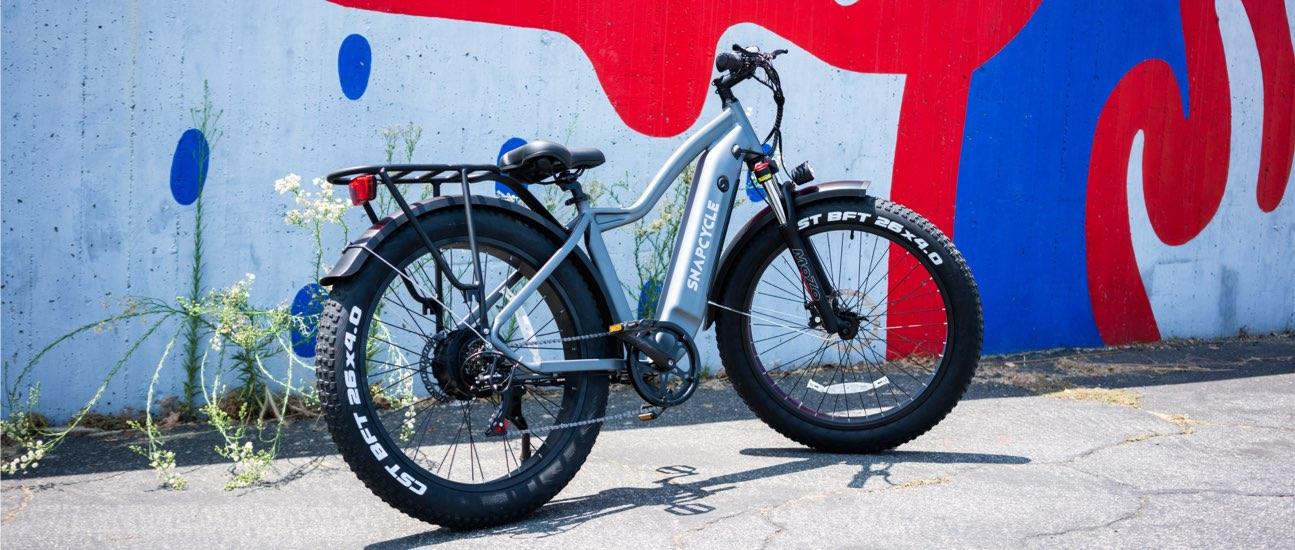You’ve seen them on local bike trails, boardwalks, schools, parks; heck, you’ve probably even seen them during your grocery runs. Ebikes are the in thing right now, and for excellent reasons we will highlight below. Affordable and environmentally friendly, many people are ditching their motorcycles and cars in favor of an ebike.
According to the Department of Energy, in 2017, data collected on one-way household trips showed that the majority (59.4%) of vehicle trips were less than 6 miles. In fact, three-fourths of all trips were 10 miles or less. Of all the trips made, 95% were 30 miles or less. An average ebike can clock between 30-70 miles per charge. The only logical conclusion to draw is that ebikes could easily replace at least 75% of all car trips. Bear in mind that the data above was obtained in 2017. In light of the COVID-19 pandemic, the average trip distance has likely dipped even further since then. So what’s holding you back from making the ebike your primary mode of transportation?

For most people, it’s one of the following. Do these apply to you?
Concern 1: Being unfamiliar with ebike regulations
What’s that about ebike classes? Are mopeds considered ebikes? Would you need a license to ride an ebike? Is there a legal speed limit for ebikes? An age requirement, maybe? Where can, and can’t you ride them? So many questions.
Concern 2: Not sure where to seek technical support
Ever come across a local bike shop that’s not ebike-friendly? Bought an ebike online, but was refused service or unable to contact your retailer? You’re not alone.
Concern 3: An abundance of choice- blessing or curse?
With hundreds, maybe thousands of ebike models to choose from in such a heavily saturated market, are you wondering where to even begin?
We’re here to answer some questions people often have about ebikes. Let’s start here:
What distinguishes an ebike from a regular bicycle?
An ebike is nearly identical to a bicycle. There are, however, some key differences: ebikes are outfitted with several important additions, such as an electric motor, a battery, an electronic display, and the consequent controls required to operate the bike. The motor provides a great boost for those who have difficulty scaling hills or steep terrain, and can even help you keep pace with traffic. An ebike is operated through either pedaling (like a regular bicycle, but with aid from the motor for that extra oomph) or throttle activation- some ebikes come with either feature, and some come with both. Mopeds are in a different category from ebikes, and will not be discussed below.

What are Class 1, 2 and 3 ebikes?
It can be confusing at first, but here’s a brief rundown:
Class 1: Max speed 20mph, pedal assist only, no throttle present. Generally allowed on paths, lanes and routes that regular bicycles are allowed on.
Class 2: Max speed 20mph, throttle present, pedal assist optional. Generally allowed on paths, lanes and routes that regular bicycles are allowed on.
Class 3: Max speed 28mph, pedal assist only, no throttle present. Generally allowed on paths, lanes and routes that regular bicycles are allowed on, except for Class 1 bike paths (bikeways that run entirely separate from motor traffic)
NOTE: These are not comprehensive descriptions of what class 1, 2 and 3 ebikes constitute, we have simply summarized it to be easily understood by all. We would still advise you to check the local rules and regulations in your area, the above specifications hold true for the state of California at the time of writing, but may be subject to changes in different states.
Snapcycle ebikes are a Class 2 and 3 hybrid. What does that mean?
Our ebikes come with both half-twist throttles and a pedal assist feature. By default, all Snapcycle ebikes are configured to Class 2 standards (max speed 20mph, throttle feature available) before being shipped out. The end user can increase the speed limit of their ebike (up to 28mph) and disable their half-twist throttle to turn their ebike into a Class 3. Not to worry, our user manuals contain clear instructions and diagrams to help you navigate your ebike’s settings.

Where can I ride my ebike?
This depends on the rules and regulations in your state. Here’s a useful resource for you. Check this site out too.
As far as California is concerned, though, Class 1 and 2 ebikes can be ridden on any path that regular bicycles are allowed on. Class 3 ebikes, however, are not allowed on Class 1 bike paths (bikeways that run entirely separate from motor traffic).
Is there an age requirement to ride ebikes?
There are minor variations to the laws in certain states, but in most areas, Class 1s and 2s can be legally operated by riders of all ages, while Class 3 riders must be a minimum of 16 years old. Please check the rules and regulations in your state to be absolutely certain.
Will I need a driver’s license to ride?
No, you do not need a license, as all Snapcycle ebikes are considered “low-speed electric bicycles”.
The federal law defines “low-speed electric bicycles” as electric bicycles with operable pedals, and an electric motor of 750 watts or less, whose maximum speed on a paved level surface, when powered solely by such a motor while ridden by an operator who weighs 170 pounds, is less than 20 mph.
Low-speed electric bicycles are not considered as motor vehicles by the Department of Transportation and users are not required to possess a license to ride them.
Will I need to wear a helmet?
Generally speaking, for bicycles, Class 1 & 2 ebikes, helmets are only required for riders aged 17 and under. Class 3 ebike riders have to wear helmets regardless of their age. However, as before, this varies by state, so it would be best to check the rules and regulations in your state to be absolutely certain.
Whether you’re riding a regular bicycle or an ebike, and regardless of the class, we’re personal advocates of wearing helmets when riding. Never take your safety for granted.
We hope you’ve found this post informative and helpful, drop us a message if you’d like to learn more.

